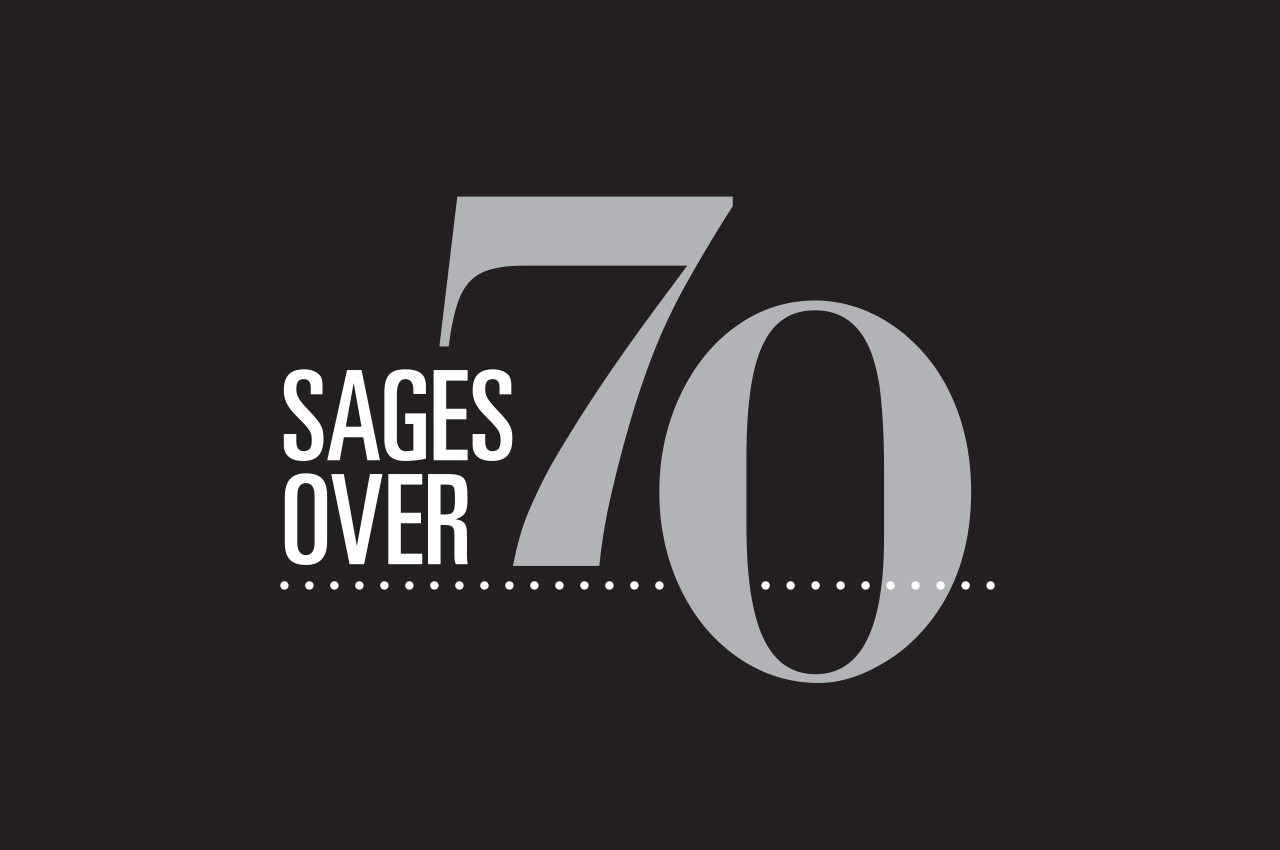Writers: Kelly Roberson and Lisa Rossi
Photographer: Duane Tinkey
For as much as the media glamorizes the epic highs and lows of youth, the hard-won wisdom and confidence that comes with aging deserves its own turn in the spotlight. Especially when you consider how Greater Des Moines has grown over the years, you’ll recognize many of the gifts the city’s senior leaders have passed down to help our community thrive.
At dsm magazine, we’re proud to salute seven of these leaders, all of whom have channeled their energy, expertise and resources to effect positive change for Central Iowa businesses, cultural institutions, charitable nonprofits and countless residents. Collectively, they’ve founded or enhanced a remarkable range of influential programs and organizations, including the Des Moines Art Center, Greater Des Moines Partnership, Latino Heritage Festival, United Way and Urban Dreams.
We honored this year’s Sages Over 70 during an awards ceremony Nov. 7 at the FFA Enrichment Center on the DMACC campus in Ankeny, where each honoree shared a few insights and thoughtful advice for the next generation of leaders. We invite you to read about them below and watch the event recap.
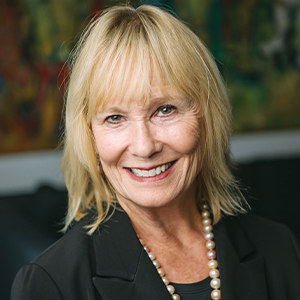
How to Live a Good Life Spoiler Alert: It’s Not Easy.
Writer: Jann Freed
Who knew Des Moines produced one of the world’s leading experts on the meaning of life?
Dr. Robert “Bob” Waldinger graduated from Theodore Roosevelt High School in 1967 and told me he tries to attend as many class reunions as he can. But he’s busy these days: He is a professor of psychiatry at Harvard Medical School, a psychoanalyst and a Zen priest.
In 1938, Harvard started a longitudinal psychological study that compared Harvard men with inner-city men without the same opportunities. Psychiatrist George Vaillant led the study from 1972 until 2004 and concluded that relationships play a critical role in creating meaningful, satisfying and even longer lives.
Vaillant concluded in his book “Aging Well” that six factors predicted healthy aging for the Harvard men: “physical activity, absence of alcohol abuse and smoking, having mature mechanisms to cope with life’s ups and downs, and enjoying both a healthy weight and a stable marriage. For the inner-city men, education was an additional factor. … The more education the inner-city men obtained, the more likely they were to stop smoking, eat sensibly and use alcohol in moderation.”
As Vaillant’s protégé, Waldinger became the study’s fourth director and expanded the study to include the original men’s spouses and children. “The surprising finding is that our relationships and how happy we are in our relationships has a powerful influence on our health,” according to a 2017 article the Harvard Gazette published about the study. “Close relationships, more than money or fame, are what keep people happy throughout their lives. Those ties protect people from life’s discontents, help to delay mental and physical decline, and are better predictors of long and happy lives than social class, IQ, or even genes. That finding proved true across the board among both the Harvard men and the inner-city participants.”
In 2015, Waldinger gave a TED Talk called “What Makes a Good Life: Lessons from the Longest Study on Happiness” that racked up more than 43 million views. “People are hungry for this kind of information,” he wrote in an email, after I invited him to be a guest on my monthly podcast.
The talk’s viral popularity prompted Waldinger and his colleague Marc Schulz to write a book called “The Good Life: Lessons from the World’s Longest Scientific Study of Happiness.” It hit shelves earlier this year, in the midst of our current era of polarized culture wars, social disconnection and a society that prioritizes many things over authentic human connections.
The new book identifies several additional “good life” factors beyond the six Vaillant noted in “Aging Well.” Trust is critical, not just among friends, family and neighbors, but also in communities. Generosity is important, too, as well as the freedom and ability to make decisions.
Even so, Waldinger emphasized one key point: “Positive relationships are essential to human well-being.” He repeats this almost as a mantra.
He knows, of course, that relationships take work and time, and they’re easy to take for granted. He said that a silver lining of the pandemic is the way it helped people appreciate their connections with family and friends.
Relationships are like threads in a tapestry. Some are strong and last forever. Others break and need to be repaired or are best left unmended. People move. They retire and move near family. Some relationships become unhealthy. Friends die.
But now more than 80 years of Harvard research — and our own common sense — tell us that relationships are worth the continual investment. Bronnie Ware notes in her book “The Top Five Regrets of the Dying” that people at the end of life often say they wish they had stayed in touch with their friends.
So how are we spending our time and to whom are we paying attention? We know we need to keep moving and stay active, but Waldinger’s persuasive research suggests that social fitness is just as important as physical fitness. We should pay attention to the people who matter most in our lives. Perhaps the Beatles said it best, “We get by with a little help from our friends.” n
Jann Freed, PhD, is a leadership coach, speaker, author and a Certified Sage-ing Leader through Sage-ing International. Her latest book is “Breadcrumb Legacy: How Great Leaders Live a Life Worth Remembering” (2023), available in stores and online at jannfreed.com.
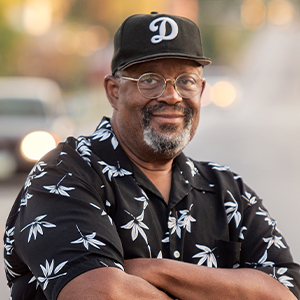
Wayne Ford
The fact that no one expected much of Wayne Ford is part of his legend. His high school classmates in Washington, D.C., voted him “most likely not to succeed.”
But he went on to play football at Drake University. He established the first U.S. Presidential Forum in 1976 under the name “Concerned Citizens for Minority Affairs” and then kick-started what is now the oldest ongoing minority presidential forum, the Brown and Black Presidential Forum. Nearly 40 years ago, he also founded Urban Dreams to train young adults for productive careers.
And then, even after he created his own consulting business to help recruit and retain minorities for employment, the guy who was once the “most likely not to succeed” was elected and re-elected to serve 14 years in the Iowa Legislature. Ford was the 10th African American legislator in the state’s history, served on nearly every House standing and appropriations committee, and authored Iowa’s landmark Minority Impact Legislation, the first of its kind in the nation.
Ford received an honorary doctorate from Drake, his alma mater, and his impact across the city and state still has ripple effects long after he’s changed elected bodies and job outlooks for all.
“I had the privilege of working with Wayne when he served Broadlawns Medical Center as a community ambassador to better connect health care with underrepresented communities, as well as co-founder of Broadlawns’ nationally recognized Teach & Tech apprenticeship program,” Jenna Knox said. “It is overwhelming to think of how many lives he saved or changed for the better through that one program alone.” — K.R.
Highlighted Achievements
- Served on the board of Boardroom Bound, a national organization that promotes the election of women and minorities to corporate boards of directors.
- Led Region XI of the National Black Caucus of State Legislators.
- Received the Daughters of the American Revolution’s Medal of Honor and Drake University’s Double D award for athletics and civic involvement.
- Was inducted into the Iowa African American Hall of Fame.
His Advice
“Keep your eyes on the prize. You’re going to be in relationships, you’re going to lose and gain money, you’ll go up and down.”
“Your dreams can become reality. When I started Urban Dreams, I had a radio show. And I called up a city councilwoman, Elaine Szymoniak, and asked if the city would fund an organization for young people. I could see we needed it. You have to have dreams and passion — without the two together, you won’t go anywhere. But together, that’s your calling card.”
“If I look at where I started, I could have stayed in Washington, D.C., but I knew I’d be dead by 21. I took a risk in 1969, and I believed that my best was yet to come. Now, I’m in the winter of my life, and I’m a realist. I want to spend time with my granddaughter and pass along a little of who I am to her.”
Community Voices
“Wayne Ford is a fierce advocate for our most underserved population. He is passionate about bringing equity and inclusion to all facets of our community. I am proud to have worked with Wayne on numerous initiatives.” Angela Connolly, Polk County supervisor
“Wayne Ford was ahead of his time when he started Urban Dreams. Many people didn’t think it would last, but he brought a sense of place, pride and support to our low-income and minority community.” Fred Hubbell, retired attorney and insurance executive
“He is a relentless advocate in pursuit of equity and opportunity for everyone in our community. His legacy is monumental, and his impact will continue long into the future. I’m grateful to have learned so much from him.” Renée Miller, chief community impact officer, United Way
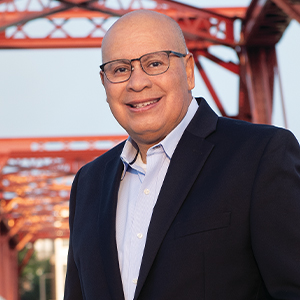
Joe Gonzalez
Joe Gonzalez was the oldest of seven and, as a child, served as interpreter for his parents, who brought the family to Des Moines from Mexico in 1957. “Having been born in Mexico and coming here is like living the American dream,” he said. “I always wanted to give back.”
He was one of the first Latinos to serve in the Des Moines Police Department, starting at age 18 in the cadet program. Later as an officer, he helped create the Hispanic Outreach Neighborhood Resource Advocate (HONRA) program so Latinos would “have a voice,” he said, “so they wouldn’t be afraid to report things as things were going on.”
Gonzalez spent 42 years with the department and retired after being crushed by a truck in 2013. “Time just stood still,” he said. “I thought I was actually going to die right there.”
The accident broke 13 ribs, collapsed both lungs, lacerated a kidney — and galvanized his sense of purpose. “I guess there was a reason I was saved, that I didn’t die,” he said. “Now I have multiple places to give back. So I’ve tried even harder to do more and more.”
After he retired from police work, he became director of the Latino Heritage Festival. Under his leadership, the annual festival now draws visitors from across the Midwest and donates $25,000 each year to organizations that serve Latinos.
One of the benefits of Gonzalez’s long career is the chance now and then to bump into people who were once into drugs or crime. “You see them later and they thank you for how you treated them,” he said. — L.R.
Highlighted Achievements
- Graduated from the Greater Des Moines Leadership Institute, now Lead DSM, and received its Community Vision Award.
- Received the LULAC Latin Heroes Award and recognition from the Domestic Abuse Coordinating Council, Iowa Attorney General’s Office, Iowa Organization for Victim Assistance and the United Latinas for a New Dawn.
- Named Police Officer of the Year in 2003 by the Des Moines Rotary Club.
- Received the Distinguished Service Medal Award from the Des Moines Chief of Police.
His Advice
Gonzalez said he always thinks of the Mark Twain quote: “The most important days in your life are the day you are born and the day you find out why.”
“To the world you might be one person, but to one person you might be the world.”
“You have to be able to treat everybody the best you can. You never know the difference it might make.”
Community Voices
“Joe’s commitment to education, workforce training and economic mobility for the Latino community is unmatched.” Ahmed Agyeman, director, Evelyn K. Davis Center for Working Families
“Every person who was mentored by Joe became a friend and considers him a lifelong resource and connector. I’ve also personally been fortunate enough to count him as a friend and mentor, and consider him one of the kindest, most humble leaders I know.” Amy Jennings, executive director, Lead DSM
“Joe has navigated adversity, especially when he had his accident of getting trapped behind a truck. He’s used those experiences … as motivation to keep doing more to benefit our community.” Daniel Zinnel, CEO, Proteus Inc.
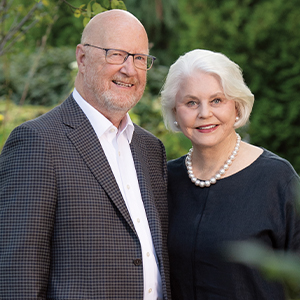
Tom and Linda Koehn
How do you measure a legacy? For some, business success offers one opportunity. For others, volunteer hours provide a different way to gauge impact.
Tom and Linda Koehn’s legacy demonstrates a rare blend of both, as they’ve channeled their skills and passions into business and the broader community in tangible ways that have made Central Iowa an attractive place to live and work.
Over three decades, the Koehns have supported an array of cultural institutions, even while balancing work and family. As chairman of the board of the Waldinger Corp., Tom has expanded the company to 44 offices in 13 states. Linda taught for 20 years, first teaching English in Mount Vernon and Chicago before helping students with learning and emotional disabilities here in Des Moines.
She learned and shared plenty of life lessons along the way. “To succeed is to use and develop your talents,” she said. “The things you do every day reflect your passions, interests and values.”
Beyond their careers, the Koehns have provided thoughtful, effective leadership and generous financial support to help numerous institutions, including Cornell College, Des Moines Symphony, Des Moines Metro Opera, Greater Des Moines Botanical Garden, Science Center of Iowa, Water Works Park and Variety – the Children’s Charity. Their impact will help Central Iowa continue to thrive for decades to come.
“I am an optimist, and even with all the problems and disagreements we hear about in our society today, I still think we live in the greatest country in the world,” Tom said. “I love Des Moines and I love Iowa. It’s such a great place to live and to work. My hope is that it remains that way far into the future.” — K.R.
Highlighted Achievements
- Together, the Koehns received the Pillar of Philanthropy Award from the Association of Fundraising Professionals and the Bravo Award from Bravo Greater Des Moines.
- Through their generosity, they are members of the Catalyst Circle of the Community Foundation of Greater Des Moines.
- Under Tom’s leadership, the Waldinger Corp. received the Economic Impact Award from the Greater Des Moines Partnership.
- Tom was inducted into the Iowa Business Hall of Fame, and Linda was named one of the Business Record’s Women of Influence.
Their Advice
Linda said, “We’re all working on being comfortable in our own skin, which requires coming to terms with the not-so-best parts of our nature. Oscar Wilde said it best: ‘Be yourself. Everyone else is taken.’”
“For me,” Tom said, “success is about achieving a level of satisfaction within the various elements of your life. Hopefully, in the end, you will have a loving family, good friends and a sense of accomplishment in a career that you have truly cared about.”
Tom added, “You get old too soon and wise too late. Live in the present. Work hard and do your best at whatever you do, but also make sure you enjoy each day of the journey.”
Community Voices
“Tom and Linda Koehn are an example to us all, and our community is stronger, richer and more beautiful because of their many gifts of time, talent and treasure.” Kim Perez, president and CEO, Greater Des Moines Botanical Garden
“The philanthropic spirit demonstrated by Linda and Tom Koehn has played a major part in the success of Des Moines Metro Opera and has greatly enhanced our community.” Michael Egel, general and artistic director, Des Moines Metro Opera
“Cornell College is a stronger institution because of them. Generations of students have and will continue to benefit from their generosity.” Jonathan Brand, president, Cornell College
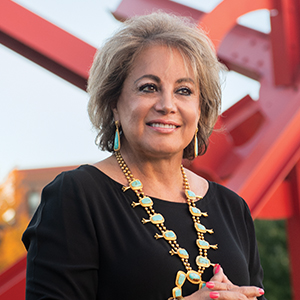
Pat Schneider
Pat Schneider’s family didn’t have a lot of money when she was growing up in Des Moines. But as her mother always said, even if you don’t have money, the two things you do have are time and talent. That advice sowed the seeds for Schneider’s lifetime of service.
She started her career as an operator for Bell Telephone. She was promoted to the business office and, for her last six years with the company, managed its corporate volunteer program. That’s how she got into the nonprofit world. The company won four national awards for community service projects that she helped lead. Her team built handicap-accessible ramps at Mount Rushmore, for example, and took patients from UnityPoint Health’s Stoddard Cancer Center to camp. She remembers one young participant who had always wanted to ride a horse and finally got the chance to do it.
After leaving Bell, Schneider led the foundation for the United Way of Central Iowa and served as president of the Junior League before moving into commercial real estate, a career she’s managed for 30 years while serving on boards for the Des Moines Art Center, Des Moines Playhouse and other organizations.
She recently helped raise $5 million to renovate and reopen the Varsity Cinema and is currently helping to raise funds for an Italian Cultural Center with a museum and a bocce pavilion at the Butler Mansion on Fleur Drive.
“I went to East High, where the motto is ‘for the service of humanity,’ and that resonated with me,” she said. “That’s why we’re all here: to help make other people’s lives better.” — L.R.
Highlighted Achievements
- Served as president of the Junior League and chaired the first Junior League Gift Mart.
- Participated in the Greater Des Moines Leadership Institute, now Lead DSM.
- Promoted the first American Girl Tea Parties, which served as a model for nonprofits nationwide.
- Chaired Des Moines’ first Race for the Cure, oversaw its growth from 900 to 25,000 participants, and helped the Polk County Health Department implement the mammography assistance fund for women in need.
- Was named one of the Business Record’s Women of Influence.
Her Advice
“Just keep doing it.”
“Include your children. Our kids have so much more than we had growing up. We have to level that out.”
“You miss 100% of the shots you don’t take.”
Community Voices
“There is nothing Pat would not do to make this state a better place for children, adults and those in need.” Loretta Sieman, community volunteer
“With her dynamic energy and determination, Pat can connect the right people at the right time to make things happen. She leads with enthusiasm and empowers those around her to think big. Pat has been a foundational leader in making Des Moines the city we know today, thanks to her mentorships and unwavering belief that people create community and anything is possible.” Lauren Burt, head of worldwide communications, Kemin Industries
“Pat is the most giving individual I’ve ever known.” Deniz Franke, private wealth advisor, Franke Miller Group
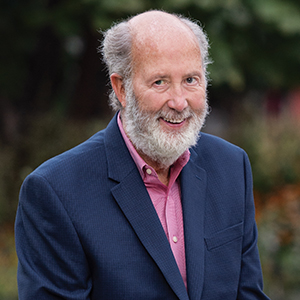
Doug West
A passion for a worthwhile cause is one thing. The ability to sustain that dedication is another. And the skill to bring professionalism and accountability to that dedication is rare indeed.
Fortunately for Central Iowa’s cultural community, Doug West has brought that well-rounded approach to the fore. Over four decades, he has contributed his time and efforts to everything from Ankeny schools to Iowa Public Radio, the Des Moines Art Center and the Des Moines Symphony. He began, as many do, with one organization — in his case, the Rotary — and then pitched in to help other groups that aligned with his family’s interests, notably sports and Boy Scouts.
By the time he switched careers, from being a clinical instructor and consultant in communication disorders and special education in the 1970s to being one of the country’s top 100 stock brokers in the hard-charging ’80s, ’90s and ’00s, he had expanded his interests and skills to transform the nonprofits and institutions that make Des Moines the cultural hub it is today.
Mentors and proteges alike are quick to mention West’s imposing physical stature and richly sonorous voice. But mostly they describe him by how many ways that voice has said “yes” when others might say “no.” As the Revs. Martha and Bob Ward put it, “He has sought to make our community a better place, and the Des Moines metropolitan area is stronger for his efforts.” — K.R.
Highlighted Achievements
- Co-chaired three successful bond issue campaigns for the Ankeny Community School District.
- Served, often as treasurer, on the boards of the Des Moines Art Center, Des Moines Performing Arts, Des Moines Symphony Foundation and New Horizons Adult Day Center in Ankeny.
His Advice
“My goal in life is simply to make a difference: to leave the world a better place for my having been here. If done correctly, by the end of your days you should be able to list a whole bunch of quantifiable ways in which the world, or at least your corner of it, is a better place for your having been here.”
“A fairer, more just world — less biased, more tolerant of diversity, less judgmental, less rife with inequality — rarely gets that way accidentally. Getting there requires an intentionality of management and focus to your life. It also requires a prioritization of your objectives.”
Community Voices
“Doug and Debbie have been and still are wonderful citizens of our community. I am so thankful to count them among my friends. We should treasure them.” Mary Kramer, retired lawmaker and ambassador
“Doug is a multidimensional and selfless man, providing talent where needed, time when asked and treasure where he can. His contributions to the area in general and society as a whole are remarkable and far-reaching.” Robert G. Riley Jr., chairman, Riley Resource Group
“Doug is a generous, kind and smart man. When he speaks his mind through that great, trademark bass voice of his, people listen.” Joseph Giunta, music director and conductor, Des Moines Symphony and Academy
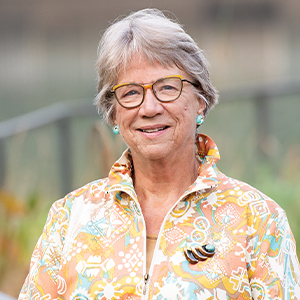
Martha Willits
Martha Willits grew up in Eagle Grove, where her parents served on the city council and helped various nonprofits. “That was in my bones,” she said. “This whole thing I witnessed in my small town turned into my life’s passion.”
Willits went to Drake University to study education and music education and then taught sixth grade in Des Moines. “I really think of myself as a teacher, and that goes lots of ways,” she said. “For a while I thought, ‘Oh, I’m leaving teaching,’ but I never really did. It was always about learning and sharing.”
That’s what she did as the first woman to serve on the Polk County Board of Supervisors and later as president and chief professional officer of the United Way of Central Iowa, where Maddie Levitt showed her the ropes. “I laugh because on the wall hangs this plaque she made, and it says, ‘Honey, I’m so proud of you,’” Willits said. “She was always proud of you and your work. She was always happy. I really loved that model and have tried to live up to it.”
When Willits became president and CEO of the Greater Des Moines Partnership, she led the charge to develop the Capital Crossroads Regional Vision Plan, a process that started at the turn of the 2000s. She said leaders “knew it was time to step up and think about amenities and things that could happen in this community to really build it into an A-plus community.”
The city’s recent Forbes designation as a top place for young professionals “was not by accident,” she said. “Those people at the partnership, at the county government, they’ve worked together to build amenities and a quality of life that are beyond the size of the community.” — L.R.
Highlighted Achievements
- Helped create the Partnership’s dual membership model, which now includes 23 affiliate chambers of commerce and more than 6,500 members.
- Oversaw the creation of Startup City Des Moines, which boosted small businesses and entrepreneurs.
- Led record-breaking fundraising campaigns for the United Way of Central Iowa.
- Helped start the Women’s Leadership Connection in 2002.
- As a Polk County supervisor, helped expand the county’s services for families, children and the elderly, as well as programs focused on housing, transportation and mental health.
- Chaired a statewide committee to rewrite service design for programs for Iowans with developmental disabilities.
Her Advice
Willits cited a quote from Martin Luther King Jr. that makes her want to “walk in other people’s shoes.” As King put it, “I can’t be what I ought to be until you are what you ought to be. And you can’t be what you ought to be until I am what I ought to be.”
“Do unto others as they would want you to do unto them.”
“I’m pretty practical so I’d say my advice would be: Be kind. Do your best. Learn and grow every day.”
Community Voices
“Martha is one of the community leaders who helped set the tone for what we could accomplish together, working as one region across the public, private and nonprofit sectors. Our community is stronger and more collaborative because of Martha’s leadership.” Tiffany Tauscheck, president and CEO, Greater Des Moines Partnership
“She has dedicated her life in service to her family, her community, her state and her nation. For all that, we are blessed.” Kent Sovern, navigator and advocate, Livable Communities
“Martha has shown a dedication to growing and improving the Des Moines area in a variety of ways. Whether through her dedication to our critical health and human services organizations supported by the United Way or through the monumental regional economic development efforts she led on behalf of the Partnership, Martha’s leadership and vision are seen and felt in every corner of our region.” Kristi Knous, president, Community Foundation of Greater Des Moines

